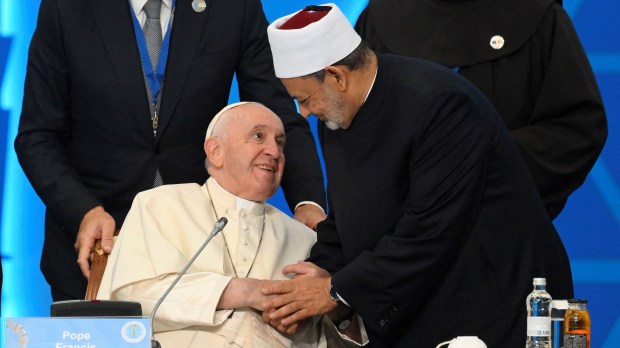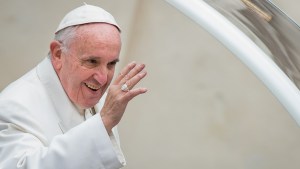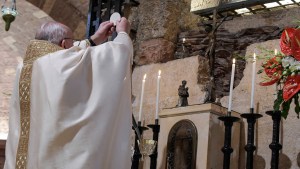With a schedule as tightly packed as the pope’s, one would assume there’s little room for spontaneity. But Pope Francis doesn’t see it that way. Instead, he’s a big advocate of guarding against “taming” the Holy Spirit, who is “freshness, imagination and newness.”
In 2019 in Abu Dhabi, United Arab Emirates, Pope Francis signed a joint declaration with the Grand Imam of Al-Azhar, Sheikh Ahmed al-Tayeb, called the Document on Human Fraternity, outlining how religions can live together in peace and harmony.
This historic document is a centrepiece in the Pontiff’s continuous dialogue with Islam, marked also by other meetings with Muslim leaders and trips to Muslim-majority countries, including his most recent one to Bahrain.
On the return flight from this trip the Pope explained how this document was born, not from a carefully constructed plan, but in fact, over lunch and the sharing of bread …
A spontaneous lunch
In response to a question from a journalist on whether the Pope felt his contacts with Islam had borne “tangible fruits,” the Pontiff told the story about a special lunch he had with the Grand Imam of Cairo’s influential Al-Azhar mosque, Sheikh Ahmed al-Tayeb, a prominent leader of Sunni Islam.
“[The Grand Imam] had come to the Vatican for a courtesy visit and we did the protocol visit. It was almost lunchtime and he was leaving, and as I went to dismiss him, I asked, ‘But where are you having lunch?’ I don’t know what he said to me… ‘Come, let’s have lunch together.’
It was something that came from the inside. Then, sitting at the table, he, his secretary, two counselors, me, my secretary, my counselor, we took bread, broke it and gave it to each other: a gesture of friendship, offering bread. It was a very nice lunch, very fraternal. And toward the end, I don’t know who came up with the idea, ‘Why don’t we write a text about this meeting?'”
The religious leaders loved the initiative and the secretaries and counselors got to work:
“A draft went, a draft came, one went and one came … And finally we took advantage of the meeting in Abu Dhabi [in 2019] to publish it. It was a thing from God, it is not understandable otherwise, because none of us had this in mind. It came out during a friendly lunch, and that is a big thing.”
The impact of the Document
The Documents outlines a list of common values to be upheld, such as freedom, peace, and the protection of the rights of children, the elderly or the disabled. Since 2019 it has been adopted by various organizations, governments, and institutions.
A Higher Committee of Human Fraternity was also created the same year to help fulfill the goals described in the statement.
In December 2020 the United Nations General Assembly adopted a resolution declaring February 4, the day when Pope Francis and the Grand Imam signed the document, as the International Day of Human Fraternity.
During the return flight from Bahrain, Pope Francis also explained to the journalists how this Document became a basis for his October 2020 encyclical, Fratelli Tutti, on fraternity and social friendship.
What I wrote later about human friendship in Fratelli Tutti also has its basis in the Abu Dhabi Document. I believe you cannot think of such a path without thinking of a special blessing from the Lord on this journey. I want to say this out of justice, it seems right that you know how the Lord inspired this path. I didn’t even know what the Grand Imam’s name was, and then we became friends and did something like two friends. And now we talk together, whenever we meet.
Bahrain: Another step in the dialogue with Islam
Pope Francis went to Bahrain from November 3 to 6, to attend the Bahrain Dialogue Forum “East and West for Human Coexistence,” a two-day gathering focused on building bridges and fostering dialogue between religious and cultural leaders.
During the trip, Pope Francis emphasized the importance of these events that allow Christian and Muslim leaders to come together, as they can foster a culture of brotherhood that can be an example for the faithful.
In fact, Pope Francis has visited a handful of majority-Muslim countries during his pontificate and attended another inter-religious meeting, the VII Congress of Leaders of World and Traditional Religions, in September in Kazakhstan.



